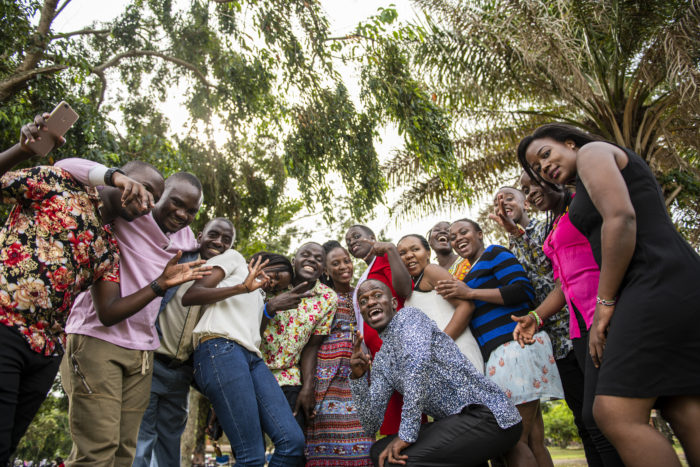“We Are Conquerors”
“When I was around 6 or 7 years of age, I nursed my mother on her sickbed,” says Bena. “I used to be in the hospital with her, and I saw the nurses. They were smart and kind, and I felt that when I grow up, I need to be a nurse to help other people who need help.”

When Bena was 8, her mother died of AIDS-related causes. Later, her father, too, died, leaving Bena an orphan. Growing up, she moved from relative to relative—and even lived with people outside of her family. Some of those guardians were hostile to Bena, and she often felt alone in the world.
Although Bena has been prescribed antiretroviral medication since she was a small child, no one told her about her HIV-positive status until she became very sick at the age of 15. Bena had stopped taking her medication regularly, not knowing what it was for.
When she learned her HIV status, Bena tried to commit suicide. The anguish was deeper than she thought she could bear. Fortunately, Bena was linked to psychosocial support through an Ariel Club created by the Elizabeth Glaser Pediatric AIDS Foundation (EGPAF). Ariel Clubs are named in memory of Elizabeth Glaser’s daughter, who died of AIDS-related illnesses at the age of 7. The clubs provide HIV education and counseling, while promoting solidarity with other young people living with HIV.
 At her very first Ariel Club, Bena was chosen to attend Ariel Camp, a weeklong retreat for children and adolescents living with HIV.
At her very first Ariel Club, Bena was chosen to attend Ariel Camp, a weeklong retreat for children and adolescents living with HIV.
“When I arrived in Kampala for Ariel Camp, the story changed,” says Bena. “I never knew that I would find people who were the same status as me and were older and had accepted their status. And I enjoyed feeding the animals. I enjoyed the talent show, especially dancing.
“I got to learn more about HIV and how to live positively. And it helped me focus on my dream of being a nurse. After the camp, I was motivated.” She has adhered to her treatment for the past eleven years and is now virally suppressed.
Now that she is grown, Bena attends a reunion with other Ariel Club graduates on Dec. 1 to celebrate World AIDS Day. They call themselves the Ariel Club Superstars and continue to provide support for each other over WhatApp and other social media.
“We are the first generation of Ariel Club to grow up,” says Bena. “The Superstars are those people who have accepted their status, who are willing to disclose their status, and who are role models for those other children out there who are being stigmatized who are being discriminated against.”
Last year, the Ariel Superstars met near Lake Victoria for a campfire, a club meeting, games, and a cake commemorating their HIV viral suppression as a group.
“It was hashtag #teamviralloadsuppression—because with viral suppression, it means that we are conquerors,” says Bena.
“They are like family for me because I have grown up with them. We have been there for each other in good and bad times.”
Bena says that despite her current cheerful attitude, she still faces dark moments, like when she was “chucked” by a boyfriend who learned her HIV status. Such moments have driven Bena to despair, but the Superstars have given her support.
“It was a bit tough for me, but I managed to talk to the counselors and with Josephine and Brian [two other Superstars]. With the counseling I was able to move on.”
 “I think I will have a reunion with these people when I am 85 years old on the shores of Lake Victoria. I don’t want to lose anyone in the family—especially not because of anything related to HIV. And I want to encourage those young Ariel children to do the same.”
“I think I will have a reunion with these people when I am 85 years old on the shores of Lake Victoria. I don’t want to lose anyone in the family—especially not because of anything related to HIV. And I want to encourage those young Ariel children to do the same.”
Now Bena volunteers as an “Ariel Ambassador,” mentoring children and adolescents living with HIV. And she is a member of the Committee of African Youth Advisers (CAYA), which provides guidance to EGPAF about best ways to reach young people with HIV education and services.
“I don’t know what I can say about Elizabeth Glaser because she’s one woman in a million,” says Bena. “If it was not because of her, I don’t know where most of us would have gotten the psychosocial support that we needed.”
“She has really given us hope and life, and we hope that as we continue to advocate and sensitize the people out there that they will really appreciate that [being HIV-positive] does not mean a death sentence. We have a life ahead and a bright future.”
“I’m happy to say that on Dec. 1, 2016, I graduated as a nurse,” says Bena with a radiant smile. “On World AIDS Day, I achieved my dream.”
Team EGPAF
Uganda
Community Mobilization



